The leaf blower is one of the most hated objects in the modern world. They’re loud, they pollute, and… how important is a leafless lawn anyway? In a lot of towns and cities, the gas-powered leaf blower has been banned. In others, there are strict guidelines on where and when they can be used. But in Los Angeles, California, the leaf blower has never gone quiet.
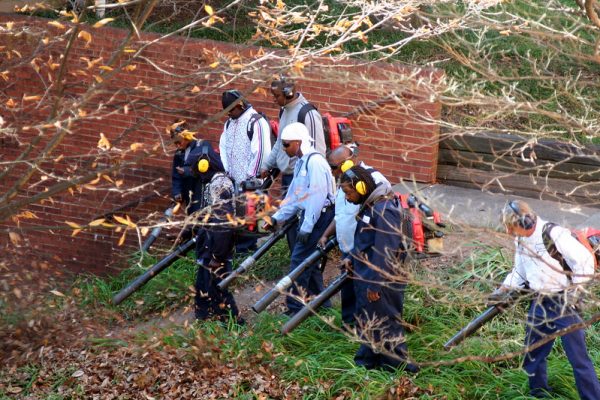
In 2024 the state of California banned the sale of gas-powered leaf blowers, but this most recent development is just the latest shot in the Los Angeles Leaf Blower Wars. This is a fight that goes back decades, and one that has kicked up questions about labor rights, environmental concerns, and ideas of beauty.
Thar They Blow
In 1970s Los Angeles, it was common for people to hose down their driveways. Homeowners, renters, and gardeners would wash dirt and leaves and whatever else out onto the street. But a serious drought in 1976 and 1977 spurred many Californians to start saving water, and stop hosing everything down all the time.
It was at this moment that Japanese company Echo debuted what they called the “clean-up machine.” Originally invented as a crop dusting device in 1947, it seemed to solve the problem perfectly: a drought-friendly way to move leaves and debris off your yard.
By 1989, some estimates say that about one million leaf blowers had been sold in America. While they were ubiquitous, they were also almost universally hated. Through the 1980s, facing pressure from home-owners and constituents in quiet neighborhoods, many city councils had introduced or passed outright bans on the leaf blower. From the start, Californian cities stood at the forefront of this war against the leaf blower, with the most high-profile ban in Southern California, Beverly Hills.
Despite all of their loudness and fumes, the leaf blower was also very fast at removing leaves from a yard. And for the people who were not just maintaining their own lawn, but many lawns, this speed was a big deal. In 1989 Jaime Aleman left his job in office supplies to start his own landscaping company. A landscaper often starts their business when an older gardener gives them a few houses – or clients. Through much of the 20th century, a lot of the gardeners in Los Angeles were of Japanese descent. But throughout the 80s and 90s that began to shift mostly to Latin American gardeners. Their circuit of clients became known as La Ruta (The Route).
More Leaf Blowers More Dollars
The difference between failure and success for a gardener is all about speed. They get paid per lawn and the margins are already small. Using a blower instead of a rake means they can work a bigger circuit of lawns in a single day. But as Aleman began his business and expanded La Ruta, tension had been building for almost a decade. Word began to spread through the community that the Los Angeles City Council was seriously considering a ban on gas-powered leaf blowers. Jaime saw this proposed ban as an obvious threat to his young business. And he started to ask around, looking for some advice on how to fight it.
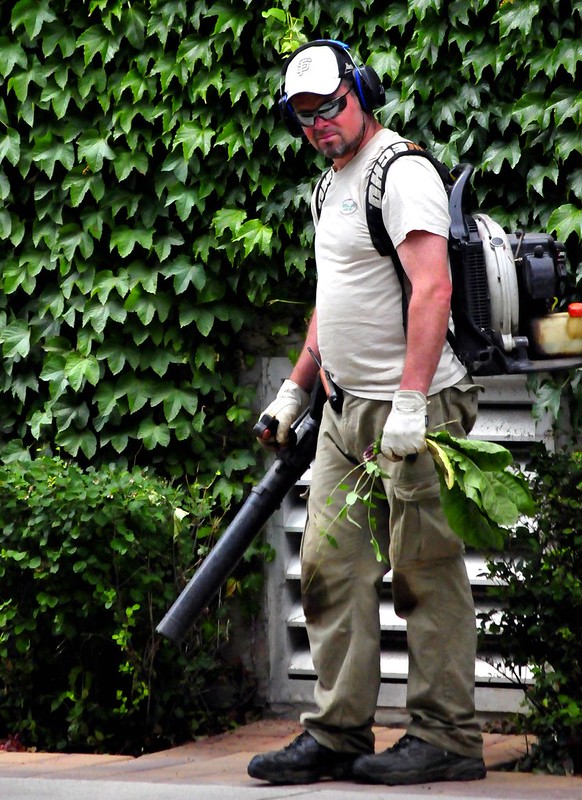
Doctor Álvaro Huerta, now an associate professor in the Urban and Regional Planning department of Cal Poly Pomona, was a young Chicano activist from Boyle Heights in 1996. He had a small group of activist friends who took on some big issues, like getting UCLA to provide financial aid to undocumented students. Huerta agreed to help Jaime, and with a small group of friends and activists, sprung into action. The Association of Latin American Gardeners of Los Angeles, or ALAGLA, was born. ALAGLA’s opponents were no small adversary. It seemed a city-wide ban would soon be passed into law.
City council, however, hadn’t thought about who was on the other side of these blowers: people like Jaime Aleman. As a landscaper, he was understandably nervous about this crackdown on a tool he used every day. ALAGLA saw that their best chance was to flip public opinion, and began planning protests to attract the press. As more national and international news outlets covered the gardener’s protests, LA’s public perception of leaf blowers became a little more complex.
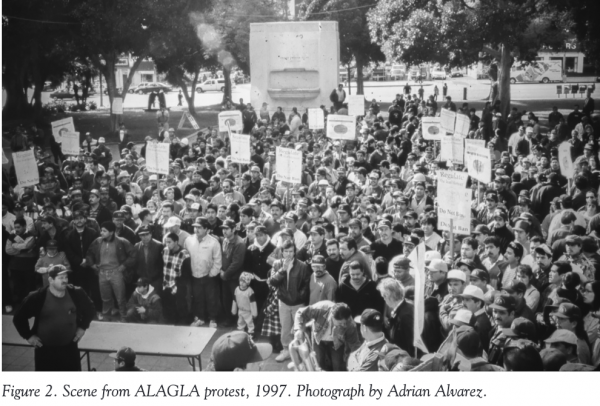
The gardeners, in turn, had a strong, simple message: this ban would make it hard for them to make a living. Any time somebody said anything in favor of the gardeners, the room erupted in applause. Ultimately, the city council voted down the substitute motion, instead deciding to vote on the single-line ordinance. When they brought up the ban on gas-powered leaf blowers it passed, easily, with 10 to 3 votes. It would soon become illegal to use a gas-powered leaf blower in the city of Los Angeles.
Crime and Punishment
If caught violating the ordinance, gardeners could face a $1000 fine and up to six months in jail. This seemed cruel and unusual punishment to many, especially for the gardeners themselves, because it threatened their livelihoods. For a while, they decided to collectively ignore the ordinance. In defiance of the new ban, the gardeners kept using the gas-powered leaf blowers. And in January of 1998 when the law was about to go into full effect, ALAGLA decided to go on a hunger strike in a bid to delay, if not outright stop enforcement of this new law.
The hunger strike began on January 3rd 1998. Many, including the organizers, set up camp on the front lawn and slept in front of city hall. Several days in, four of the men had become dangerously weak, and dropped out at the request of doctors. But the remaining seven hunger strikers made it seven days, to Friday. Finally, a few City Council members and Mayor Riordan pledged, in writing, to negotiate with the gardeners. They likely wouldn’t stop enforcement, but they did vote to lessen the punishment. It wasn’t the sweeping victory ALAGLA wanted, but it was enough of a win for the gardeners to end the hunger strike and go home.
Even though public opinion had shifted, the ban on gas-powered leaf blowers still became law. After the ordinance with the reduced fine went into full effect, Huerta and the rest of ALAGLA hatched one final plan. Since the law specifically banned gasoline-powered blowers, some gardeners switched to methanol-powered blowers to circumvent the law. These converted methanol blowers would be just as loud, just as polluting, but technically legal. But because it is difficult to even check whether a blower is powered by methanol rather than gasoline, law enforcement stopped enforcing the ban altogether.
The War Rages On
Ultimately, the leaf blower ban didn’t really work. The police decided not to enforce the law. The gardeners lost the fight in city hall, but in the end they won a quiet…or not so quiet – victory. The ban passed, but without real enforcement, the gardeners kept their leaf blowers
The Leaf Blower Wars faded into the background for a while. But in 2024, nearly three decades after ALAGLA’s hunger strike, they’re beginning to flare up again. And this time, the gas-powered leaf blower might actually be on its way out. According to Michael Cacciotti, Vice Chair of the South Coast Air Quality Management District, lawn equipment surpassed cars and light duty trucks as a major source of pollution.
In addition to the evidence of significant hearing loss when subjected to that level of sustained noise, the emissions are serious, as there is no catalytic converter to break down pollutants and reduce smog. However, battery technology and electric leaf blowers have come a long way in the last 30 years, making the modern day fight mainly about getting people to switch to electric.
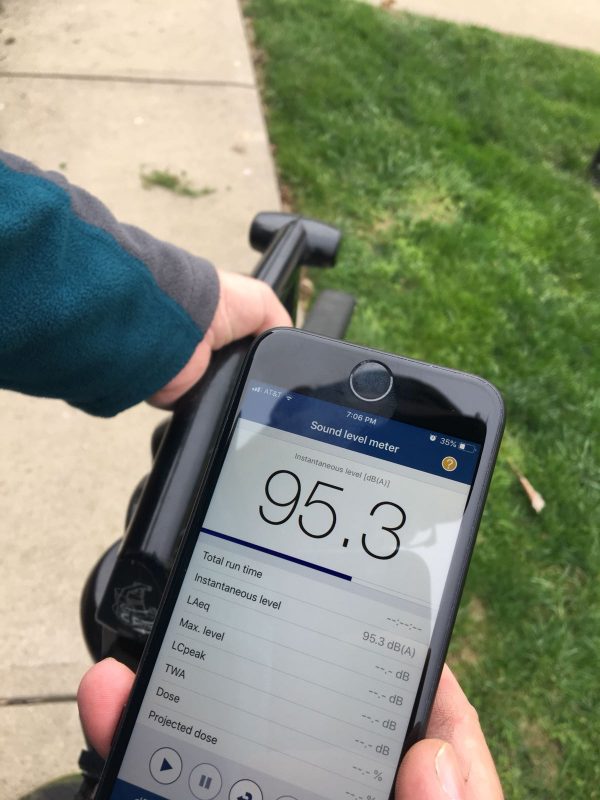
This time around, the government did offer subsidies to get gardeners switched, and some municipalities made a good faith effort to work with them. But in reality, the electric leaf blower is at best an imperfect alternative. Of the three central arguments against blowers: Noise, Dust, and Emissions…the shift to electric really only solves the third.
Throughout the fight in the 1990s, representatives from the leaf blower manufacturers promised quieter, cleaner machines, but as multiple council members pointed out in the meetings, they never delivered on that promise of a quiet leaf blower. It seems in some part, that this state-wide ban is aimed at forcing those manufacturers to come up with better solutions. An idea is to involve gardeners in the political and design process, make sure they aren’t penalized for doing the job they’re hired for, and in the meantime ask ourselves if beauty is a leafless yard, or a quiet one.
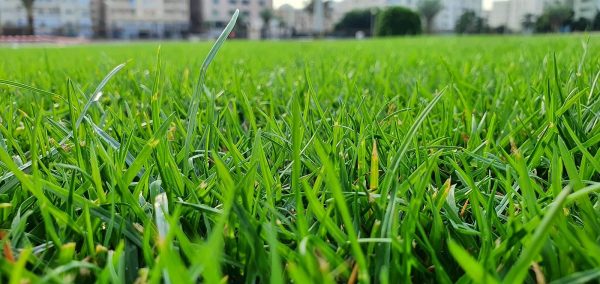



Leave a Comment
Share